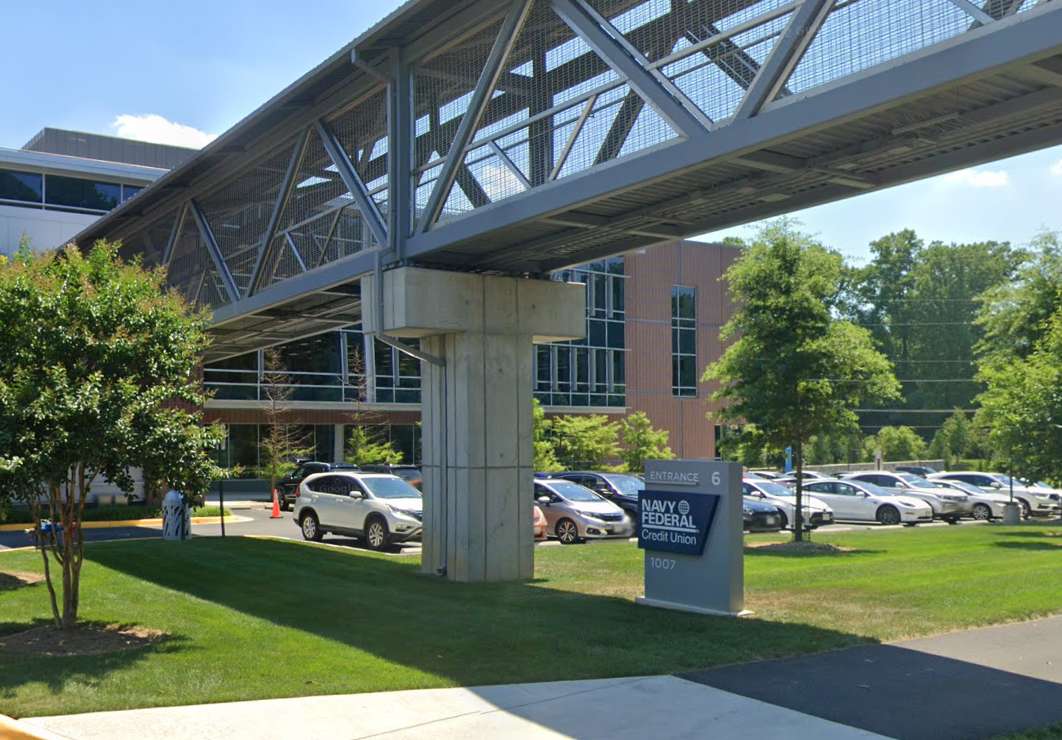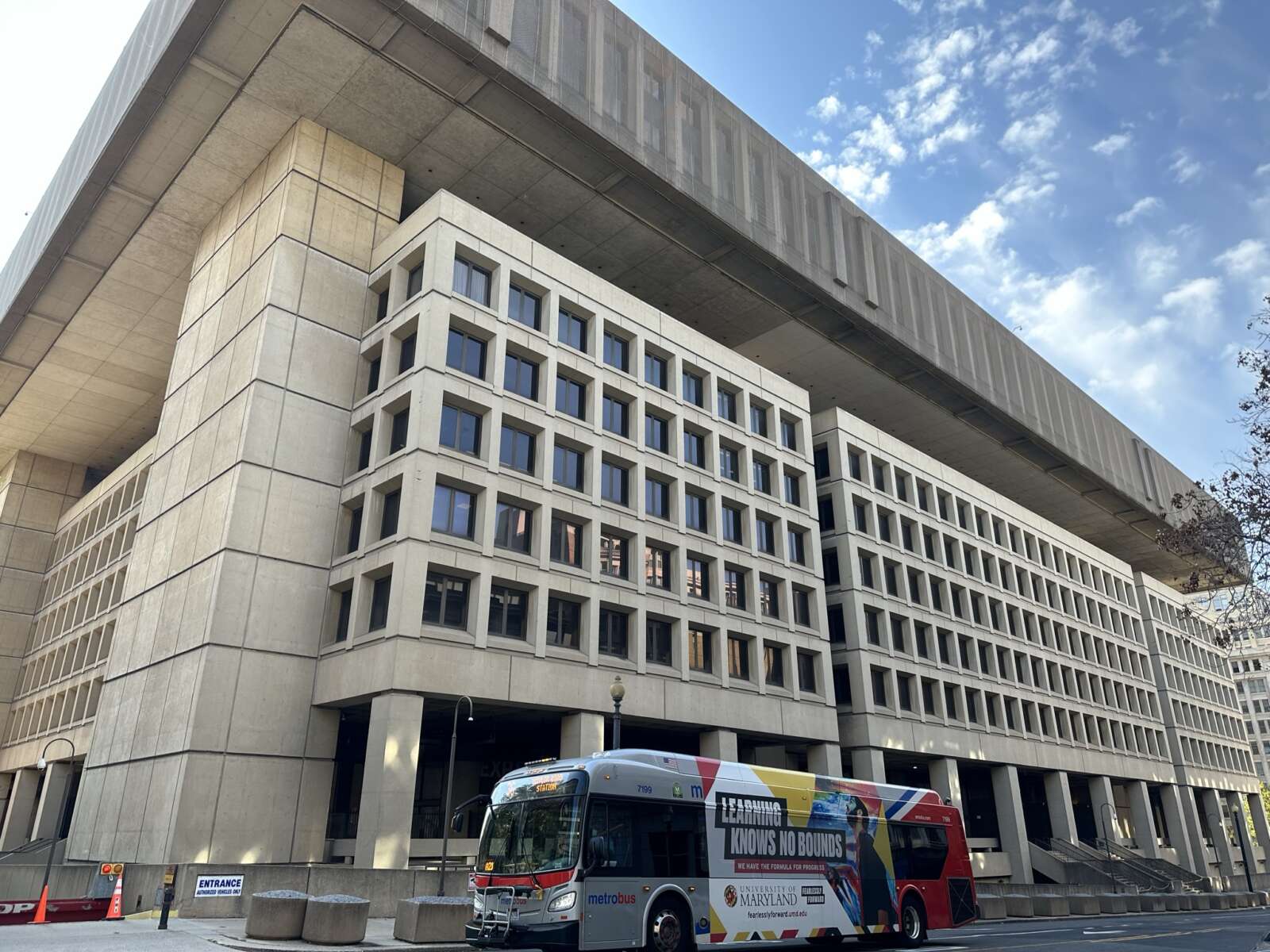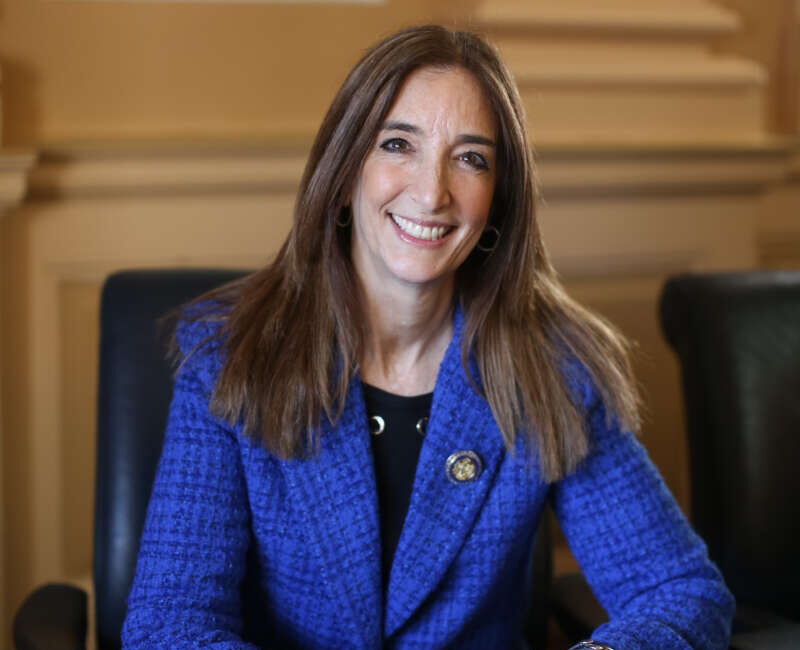
(Updated at 3:35 p.m.) Congress has passed another short-term budget package, averting a partial shutdown of the federal government just hours before a midnight deadline.
In addition to funding the Justice Department, Housing and Urban Development, and other key agencies, the slate of bills passed 75-22 by the Senate on Friday (March 8) includes $12.7 billion in “pork” — money designated for local projects requested by lawmakers for their constituents.
In a joint press release, Sens. Tim Kaine and Mark Warner announced that Fairfax County and other Virginia localities will be among the beneficiaries of the more than 6,600 projects that got funding, per the Associated Press.
“I’m proud that we secured funding for 105 community projects across Virginia that will improve transportation, upgrade water infrastructure, support health care, and more,” Kaine said. “I urge Congress to take up the rest of the government funding bills as soon as possible.”
According to breakdowns provided by Warner’s and Rep. Gerry Connolly’s offices, the biggest allocation for Fairfax County is $4.1 million “to fund a new homeless and domestic violence shelter for families.”
The county’s existing domestic violence and family shelters have exceeded their useful lives, but instead of building new facilities, the Fairfax County Redevelopment and Housing Authority is planning to convert an existing “extended stay” hotel that will be able to house about 50 families a day.
“Site acquisition activities are ongoing, with the goal of securing a location that is well-served by transit, and close to jobs and services,” FCRHA spokesperson Allyson Pearce said.
Connolly’s office says the site “will entail combining rooms, creating service and office space, and other changes to the existing hotel setup,” noting that converting an existing building instead of constructing a new one will enable the county “to deliver this essential, brand new facility years earlier than might otherwise be accomplished.”
The county has two shelters specifically for people fleeing domestic violence — Artemis House and Bethany House — and two shelters that accommodate people with children — the Katherine Hanley shelter outside Centreville and the Patrick Henry shelter in Seven Corners.
The Fairfax County Board of Supervisors approved plans in August 2022 to replace the Patrick Henry shelter with supportive housing after some delays related to land acquisition challenges.
The appropriations package also includes funding for several road and pedestrian projects:
- Spring Street widening from four to six lanes between Herndon Parkway and Fairfax County Parkway ($1 million)
- Fox Mill Road and Pinecrest Road intersection improvements in Herndon ($850,000)
- Silverbrook Road and Lorton Road intersection improvements ($850,000)
- Sidewalk on Ninian Avenue and along Bush Hill Drive to improve safety and accessibility for Bush Hill Elementary School students in Rose Hill ($850,000)
- Gunston Road shared-use path from Julia Taft Way to the Pohick Bay Golf Course entrance in Lorton ($500,000)
- Compton Road bicycle and pedestrian path from the Bull Run Special Events Center access road to the Cub Run Stream Valley Trail in Centreville ($500,000)
- Stone Road trail from the I-66 interchange to an existing trail along southbound Route 28 in Centreville ($500,000)
The Fairfax County Department of Transportation applied for federal grants last summer to fund the Bush Hill and Compton Road projects. Read More

A planned 14-gate concourse at Dulles International Airport received a major federal lift this week.
Yesterday, Senators Mark Warner and Tim Kaine announced that the Tier 2 Concourse East project will get $35 million in funding from the Bipartisan Infrastructure Law that Congress passed in 2021.
The funds will help finance the 400,000-square-foot terminal building, which will provide a direct connection to the Aerotrain that helps customers move around the airport and a direct connection to Metro’s Silver Line station at Dulles.
“Dulles Airport is a beacon for both domestic and international flights, and has expanded rapidly over the past decade,” the senators said in a statement. “This funding will improve travel for passengers and ensure that the airport stays functional and safe while continuing to meet flight demands.”
The project broke ground in November, and preliminary construction activities are underway, Metropolitan Washington Airports Authority (MWAA) spokesperson Crystal Nosal confirmed.
“This project will be a significant step in upgrading aging facilities at the airport to enhance customer service and meet future infrastructure needs,” Nosal wrote in a statement.
A complete timeline for the estimated date of completion was not immediately available.
In its statement, MWAA said it was appreciative of the federal funds to support the concourse project, which is projected to cost between $500 million and $800 million in total.
MWAA announced in April 2022 that it had applied for $230 million in Federal Aviation Administration grant funding from a program created by the Bipartisan Infrastructure Law to help airports upgrade or replace aging facilities.
“We are grateful to our partners at United Airlines and members of the Northern Virginia congressional delegation as well as officials in the Commonwealth of Virginia and local governments for their strong support of this effort,” MWAA said. “We also thank regional business groups for their support in this grant process.”

Virginia Sen. Tim Kaine is calling on the federal government to investigate whether Navy Federal Credit Union has discriminated when approving loans to homebuyers.
The country’s largest credit union, which is headquartered in Vienna, rejected more than half of the Black people who sought a conventional home purchase mortgage in 2022, despite approving over 75% of white borrowers seeking the same loan, CNN reported last month.
Hispanic applicants also got approved just 56% of the time compared to 77% for their white counterparts, according to the report, which was based on data from the Consumer Financial Protection Bureau (CFPB).
The disparities, which exceed those reported by other major lenders, suggest Navy Federal’s practices may violate prohibitions on discrimination in the Fair Housing Act and the Equal Credit Opportunity Act (ECOA), Kaine and other senators wrote in a Jan. 12 letter urging a review by the CFPB and Department of Housing and Urban Development (HUD).
“While it is appropriate for a lender to deny a mortgage application when the loan will not be sustainable for the borrower, those decisions are made based on a borrower’s financial ability to repay the loan,” the senators said. “It should go without saying that a person’s race, or any other protected characteristic, should never be a factor.”
Founded in 1933 to provide loans to Navy Department employees, Navy Federal has grown to 13 million members and now serves all branches of the military, along with Department of Defense civilians, veterans and their families. The not-for-profit credit union has over 350 branches around the world and employs more than 4,000 people at its headquarters (820 Follin Lane), according to its website.
A spokesperson for Navy Federal Credit Union said the organization has “already initiated a review to assess our mortgage lending policies and practices,” noting that more of its conventional mortgage loans go to Black borrowers — about 18%, per CNN — than most other large lenders.
However, CNN reported that most Black applicants are still getting denied, and the racial disparities persisted even when variables like income, property value and neighborhood characteristics were the same.
“Navy Federal is committed to serving each and every one of our members fairly, and we strive every day to expand economic opportunity and access to credit for our diverse community of members,” the Navy Federal spokesperson said. “…We will continue to work to support all of our members — including Black borrowers — to help them build strong financial futures.”
Homeownership emerged in the post-World War II years as a critical path for accumulating wealth. Over the past 10 years, homeowners have gained anywhere from $98,900 to $150,800 in wealth from rising home values, depending on their income, according to a National Association of Realtors report.
However, Black and Hispanic residents have often been excluded by segregation, redlining and other discriminatory practices, leading to the creation of the 1968 Fair Housing Act, which prohibits discrimination based on race, gender, disability and other identity factors.
The legislation helped narrow the gap between white and Black homeowners, but those gains were erased by the 2008 recession, according to Urban Institute. The Metropolitan Washington Council of Governments announced last week that Fairfax County is among eight localities that have adopted a Regional Fair Housing Plan intended to improve access to housing.
In a press release, Kaine noted that he, fellow Virginia Sen. Mark Warner and other senators introduced legislation last July to reduce the wealth gap by helping first-time, first-generation homebuyers get mortgages.
Image via Google Maps

Local and state officials in Virginia say the path to dig Metro out of its looming $750 million deficit is uncertain — but action is necessary to avoid the significant service cuts, systemwide fare hikes, layoffs and station closures laid out in the transit agency’s newly proposed budget.
Leaders in Fairfax County — which already faces lean economic times — say they don’t plan to offer up additional funds unless jurisdictional and federal partners can throw some more skin into the game.
“What we have said is there’s absolutely no way that local governments can bear the responsibility of that entire bill,” Fairfax County Board of Supervisors Chairman Jeff McKay told FFXnow in an interview before the Washington Metropolitan Area Transit Authority released its official budget proposal.
WMATA has been sounding the alarm on its projected budget shortfall since June.
“What I think you’re going to see happen is there’s going to be some matching and some partnerships,” McKay said.
In a first glimpse of the proposed budget, which was released last Tuesday (Dec. 12), Metro General Manager Randy Clarke laid out what would happen if Metro can’t secure local, state and federal funds to address a problem that has been coalescing for years.
“Metro is facing an unprecedented, existential crisis that requires our region to rally together if we want to avoid the catastrophic impacts this budget would have on our region,” he said.
The system would close at 10 p.m. every day and shutter 10 low-ridership stations. Silver Line trains would turn back at Stadium-Armory, with trains running between Ashburn and that station. Similar reduced turn-backs would take place on the Red Line.
Trains would run every 15 minutes for most stations — a 17 to 67% increase in wait-times across the board on weekdays — and every 20 minutes on weekends for most stations — a 40 to 70% increase. Fares would also jump by 20%.
Among other cuts and more than 2,000 layoffs, Metro would use $193 million from its capital funds to cover operating maintenance expenses — essentially borrowing against the future.
“Such a large transfer of capital funds to operating expenses puts the system’s state of good repair, including safety and reliability, at risk, and threatens to delay, defer, decrease, or cancel several long-term projects to modernize the system,” WMATA cautioned in a press release.
But it’s unclear when and if local and state bodies will offer up enough funding. The subsidized system relies on annual subsidies from Maryland, Virginia and D.C., as well as fare revenue and federal dollars. The fiscal year 2025 budget begins July 1, 2024.
Metro needs subsidy increases of $180 million from Virginia, which has already allocated $348 million. Similar increases are sought from other jurisdictions. The upcoming General Assembly session will determine how much the state is willing to put down to assuage the bleeding after federal COVID-19 funding ends for the system. Read More

(Updated at 4:15 p.m.) The federal government has officially decided to review its decision to award the FBI’s new headquarters to Prince George’s County, Maryland, over Fairfax County.
The inspector general’s office for the General Service Administration has initiated an evaluation of the “process and procedures” that led the agency to choose a 61-acre site near the Greenbelt Metro station for the FBI’s future headquarters campus, according to a letter sent to Sen. Mark Warner (D-Va.) today (Thursday).
“We intend to begin this work immediately and will share with you and the relevant committees a copy of any report which may result from this evaluation,” acting Inspector General Robert Erickson wrote.
The GSA announced on Nov. 9 that the Greenbelt site had prevailed over the former Landover Mall in Prince George’s County and its own Franconia Warehouse Complex (6808 Loisdale Road) in Springfield, concluding a combative search that spanned three presidential administrations.
Local, state and Congressional representatives in Virginia quickly blasted the decision, arguing that the GSA should’ve followed a panel recommendation that identified the Springfield site as the “most advantageous.” Those criticisms coalesced into a call for an investigation after a leaked letter showed that FBI Director Christopher Wray had opposed the Greenbelt location and raised conflict-of-interest concerns.
Wray suggested former GSA Commissioner of Public Buildings Nina Albert may have interfered with the process to favor the Greenbelt site, which is owned by Metro, her previous employer. The GSA disputed Wray’s claims, noting that it had reviewed Albert for possible ethics conflicts in 2021 and found that her history with Metro wasn’t disqualifying.
Warner and fellow senator Tim Kaine welcomed the inspector general’s announcement of an investigation in a joint statement with Virginia’s House of Representatives delegation, including Reps. Don Beyer, Gerry Connolly and Jennifer Wexton.
Given the overwhelming evidence suggesting that the General Services Administration (GSA) administered a site selection process fouled by politics, we agree that an inspector general investigation is the appropriate next step. We applaud the inspector general for moving quickly and encourage him to move forward to complete a careful and thorough review. In the meantime, the GSA must pause all activities related to the relocation until the IG’s investigation is complete.
A spokesperson for the GSA’s Office of the Inspector General confirmed the office has started an evaluation of the headquarters site selection in response to the request from members of Congress, which it is taking seriously.
“All inspectors general regularly receive requests to conduct oversight from Members of Congress and must regularly decide whether the subject matter of the request supports directing OIG resources to answer some, none, or all of the issues raised in the request,” the office said in a statement. “GSA OIG’s decision to start an evaluation reflects the importance of the FBI headquarters project and is consistent with our past work in this area.”
Currently located at 935 Pennsylvania Avenue NW in D.C., the FBI has been seeking a replacement for the aging J. Edgar Hoover Building for more than a decade now. The GSA initiated a search in 2012, but it got put on hold during Donald Trump’s presidency.
In a subsequent review, the Justice Department’s inspector general determined that the Trump administration’s push to keep the FBI headquarters in D.C. was not influenced by “improper considerations or motives.”

And then there were five.
Del. Dan Helmer of Fairfax County announced Wednesday morning that he is joining the race for the Democratic nomination in Virginia’s 10th Congressional District next year.
Helmer, a U.S. Army veteran who was first elected in 2019, led the House Democratic Caucus’ campaign effort this fall, which resulted in Democrats picking up three seats and regaining control of the chamber.
The 10th District is currently represented by Rep. Jennifer Wexton, a Democrat, but Wexton announced earlier this year she will not seek reelection for health reasons.
Other Democrats who have announced campaigns for the seat are:
- Current state Sen. Jennifer Boysko of Fairfax County
- Former Speaker of the House Eileen Filler-Corn
- Former Virginia Secretary of Education Atif Qarni
- Current Del. David Reid of Loudoun County
Loudoun Board of Supervisors Chair Phyllis Randall had been mentioned as a candidate, but she ruled out a run Tuesday, saying she wanted to focus on her third term as board chair.
The 10th District includes all of Loudoun County — making up more than half its voters — along with all of Fauquier and Rappahannock counties and the cities of Manassas and Manassas Park. It also includes the western half of Prince William County and about 15,000 voters in the Clifton and Union Mill areas of southern Fairfax County.
After knocking off Republican Barbara Comstock in 2018, Wexton won reelection to the newly drawn 10th District last year with about 53% of the vote, defeating Republican Hung Cao.
Helmer was reelected Tuesday to House District 10, defeating Republican Jim Thomas with over 58% of the vote. His district covers southwestern Fairfax, including the town of Clifton and the Centreville area. Before redistricting after the 2020 Census, he also represented a small portion of Prince William.
Helmer is the son of an immigrant and the grandson of refugees and Holocaust survivors, according to a news release from his campaign. He graduated from the U.S. Military Academy at West Point, and served tours in Iraq, Afghanistan and Korea. He currently owns a small business and continues to serve as a lieutenant colonel in the U.S. Army Reserve.
“My grandparents came to America to escape the Nazis,” Helmer said. “It’s why I volunteered to serve our country and protect the democracy that took us in. While I was proud to serve, I lost friends in Iraq and Afghanistan because politicians lacked the courage to stand up to President Bush’s misguided wars. Our democracy failed us.”
He said democracy faces greater threats today: “MAGA extremists are seeking to undermine free and fair elections and strip away the right to an abortion, all while coddling a gun lobby that floods our streets with weapons of war.”
According to the release, in the General Assembly, Helmer supported gun safety bills, the repeal of Virginia’s “Right to Work” laws and women’s healthcare.
He lives in Fairfax with his wife, Karen, a public school educator, and their two sons.
Photo via Dan Helmer/Facebook. This article was written by FFXnow’s news partner InsideNoVa.com and republished with permission. Sign up for InsideNoVa.com’s free email subscription today.

(Updated at 4:10 p.m.) Virginia’s elected leaders may not agree on issues like abortion access or education, but they remain united by the conviction that the Commonwealth would be a better host than Maryland for the FBI.
After coming together to pitch a Springfield warehouse as the best site for the law enforcement agency’s new headquarters, Republican Gov. Glenn Youngkin joined Democratic senators Mark Warner and Tim Kaine and Virginia’s bipartisan House delegation last Thursday (Nov. 9) to blast the federal government for awarding the facility to Prince George’s County instead.
“It was outrageous,” Warner said in a press call earlier that day. “I mean, Virginia clearly was the better case. Virginia clearly was winning the first set of criteria. The fact that political pressure was put on to try to change the criteria really stunned me.”
Their outrage was echoed by Fairfax County Board of Supervisors Chairman Jeff McKay, who has called Springfield a “no-brainer” choice for the FBI’s new headquarters.
“This is profoundly disappointing and defies common sense,” McKay said in a statement to FFXnow. “The FBI headquarters should be strategically located near the training academy in Quantico, a short VRE ride from the Springfield site. This decision will not serve the long-term needs of the FBI or its employees nearly as well as the Virginia site would.”
The General Services Administration (GSA) announced Thursday that it has selected a 61-acre site near the Greenbelt Metro station in Maryland to serve as the FBI’s new headquarters campus, confirming an initial report by the Washington Post that came out a day earlier.
“The site was the lowest cost to taxpayers, provided the greatest transportation access to FBI employees and visitors, and gave the government the most certainty on project delivery schedule,” the agency said in a press release. “It also provided the highest potential to advance sustainability and equity.”
The decision appears to have concluded a years-long effort to replace the FBI’s aging hub at 935 Pennsylvania Avenue NW in D.C. that dragged on through four presidential administrations.
However, a previously confidential report released by the GSA showed that a site selection panel convened this summer had recommended the Springfield site — currently known as the GSA Franconia Warehouse Complex at 6808 Loisdale Road — as the one “most advantageous to the Government.”
The panel, which consisted of two GSA employees and one FBI employee, noted that the site had the advantage of already being owned by the federal government and had more capacity for an expansion than the Greenbelt site, which ranked the lowest of the three options on that criteria.
The Greenbelt site came out ahead of the former Landover Mall, also in Prince George’s, but it was the “least advantageous” when it came to the top criterion: proximity to other facilities critical to the FBI, including its training academy in Quantico and federal agencies in D.C. like the Justice Department.
Further raising eyebrows in Virginia, FBI Director Christopher Wray rejected the proposed relocation to Greenbelt in an Oct. 12 letter first reported by the Washington Post, stating that former GSA Commissioner of Public Buildings Nina Albert’s previous job with Metro created “unresolved” conflict-of-interest and transparency issues. Read More

The Greater Reston Chamber of Commerce is joining other local chambers and the Northern Virginia Regional Commission to offer help to federal government employees and contractors if the government shuts down.
Local businesses can sign up online to offer a discount in the event Congress fails to pass a budget by this Friday, Nov. 17.
“Northern Virginia’s business community has always been generous in a time of need,” NVRC Chairman and Alexandria Council Member John Chapman said. “This effort is just one way we can let our friends and neighbors know that working together we can help those who are impacted by this unnecessary shutdown.”
Interested businesses can go online to sign up to list a discount. They must provide their location, contact information and a description of the discount offered.
So far, the chambers taking part in the initiative include Arlington, Greater Reston, Loudoun County, Prince William County and Purcellville Business Association.
NVRC is a council of 13 local governments in the Northern Virginia area. According to the organization’s senior regional demographer, Northern Virginia jurisdictions averaged 73,318 federal government jobs, as of the end of 2022, not including the region’s many federal contractors and military workers stationed at Fort Belvoir and other sites.
The federal government was on the verge of shutting down, starting Oct. 1, until lawmakers passed a last-minute, stopgap budget that would keep federal agencies and services like WIC — the program that provides food assistance to women and children — going until Nov. 17.
However, Congress still has not developed a new, longer-term plan to keep the lights on in Washington, as disagreements over emergency aid for Ukraine and Israel, among other issues, have stymied negotiations.
House Republicans unveiled a proposal on Saturday (Nov. 11) that would provide funding in two steps, covering some bills until Jan. 19 and others until Feb. 2, according to NBC News.
“Democrats in both chambers have made it abundantly clear that they hate the idea, as does the White House — all of whom want a simple extension of government funding without any gimmicks,” NBC News said. “Democrats’ unified opposition to the laddered [continuing resolution] could mean the House will ultimately have to swallow whatever clean or relatively clean CR the Senate passes.”

State Sen. Jennifer Boysko has joined the race to replace Rep. Jennifer Wexton as Virginia’s 10th Congressional District representative.
Boysko announced her candidacy today (Thursday), just two days after winning reelection as senator for the 38th District, which encompasses Reston, Herndon, McLean and Great Falls. The district includes portions of the former 32nd District represented by State Sen. Janet Howell, who opted not to seek reelection after redistricting paired her with Boysko.
“From the PTA to the state Senate, I’ve always brought people together to find common ground and work towards common sense solutions,” Boysko said in her campaign announcement. “In Washington, I’ll continue to build on the work of Congresswoman Wexton to bring a better future for our kids and make life better for Virginia’s workers and families. This grassroots campaign to fight for what’s right starts right here, right now. I ask for your vote.”
Boysko’s new campaign website highlights access to abortion, gun violence prevention and “economic policies that work for everyone and lift people up” as the issues central to her platform.
Boysko previously served in the House of Delegates, representing the 86th District from 2016 to 2019, when she got elected to the Senate to replace Wexton, who had just been elected to Congress in 2018.
Wexton said on Sept. 18 that she won’t seek reelection next year after getting a rare neurological disorder called Progressive Supra-nuclear Palsy. Initially diagnosed as Parkinson’s disease, the condition affects “body movements, walking and balance, and eye movements” and has no treatment, she said in her announcement.
Boysko’s competition for the 10th Congressional District — which covers Loudoun and Prince William counties — includes former House of Delegates speaker Eileen Filler-Corn and Mike Clancy, a Loudoun County resident, lawyer and business executive, per his campaign site.
Currently representing Fairfax County from Mantua to Burke as the 41st House District delegate, Filler-Corn announced this spring that she wouldn’t seek reelection, a move that prompted speculation of a potential run for governor. She launched her bid for Wexton’s seat on Oct. 18.
Clancy previously sought a Republican nomination for the 10th District in 2022.
With the Congressional election not coming until 2024, Boysko said in a statement to FFXnow that she remains committed to serving in the state legislature for the upcoming session, citing paid family medical leave as one of her top priorities:
I’ve had a lot of my constituents that have called and asked me if I would run for Congress. They believe that I’m the right person for the job, having represented half of Loudoun County over the past five years, having been in this community for 20 years, helping solve problems. I think my constituents want to see me work at a higher level as an asset and an ally in the Commonwealth of Virginia to make sure we’re getting stuff done.
As for the state Senate, the election’s not until next year, and I look forward to serving in this 2024 General Assembly Session. There’s a lot that I want to get done. Thanks to the hard work of our candidates, we just won the majority in the House and the Senate. I want to get paid family medical leave done at the state level, and I believe that I’ll be able to do that during this session. I’m looking forward to this next year.
Boysko filed a bill during the 2023 General Assembly session that would’ve established a statewide paid family and medical leave program, starting in 2026, but the legislation was left in committee.

(Updated at 1:20 p.m.) Former speaker of the Virginia House of Delegates Eileen Filler-Corn announced Wednesday she will seek Virginia’s 10th District seat in the U.S. House of Representatives next year.
The 10th District is currently represented by Democrat Jennifer Wexton, but she announced in September she will retire at the end of her current term after being diagnosed with a rare neurological disorder.
Filler-Corn, a Democrat, does not live in the 10th District, which consists of all of Loudoun, Fauquier and Rappahannock counties, western Prince William County, the cities of Manassas and Manassas Park, and Clifton in Fairfax County. She currently represents the 41st District in the House of Delegates, which generally consists of the Burke and Burke Centre areas of central Fairfax County.
While members of the Virginia General Assembly must live in the districts they represent, U.S. House members are not required to do so. Rep. Abigail Spanberger won reelection in the 7th District last year even though the district’s boundaries were moved to Northern Virginia from the Richmond area.
Filler-Corn was first elected to the House of Delegates in 2009. After Democrats won control of the House of Delegates in the 2019 election, she served as speaker during the 2020 and 2021 General Assembly sessions. She was the first woman and the first Jewish person elected to that position. She decided not to run for reelection to her House seat this fall after redistricting placed her into a district with another Democratic delegate.
Filler-Corn had been considered a potential candidate for governor in 2025. Current Gov. Glenn Youngkin cannot run for reelection.
Filler-Corn said in a statement that Democrats in the 10th District encouraged her to run for the seat. “As a Jewish American, I have deeply felt the tragedies of the past few weeks. Congress has been left rudderless at a time of global uncertainty. The American people and our allies abroad deserve better than this.”
Other potential Democratic candidates mentioned for the 10th District seat include Phyllis Randall, who is seeking reelection this fall to a third term as chair of the Loudoun Board of Supervisors, and current Del. David Reid of Loudoun.
Wexton first won the 10th District seat by ousting Republican Barbara Comstock in 2018, but the seat became slightly more conservative in redistricting after the 2020 Census. In last fall’s election, she held off a challenge from Republican Hung Cao by about 6 percentage points.
Meanwhile, Spanberger, whose 7th District includes eastern Prince William and all of Stafford County, is also eying a run for governor in 2025, which would leave both the 7th and 10th district seats without incumbents heading into the 2024 congressional elections. Spanberger defeated Republican Yesli Vega, a Prince William supervisor, by about 5 percentage points last fall.
This article was written by FFXnow’s news partner InsideNoVa.com and republished with permission. Sign up for InsideNoVa.com’s free email subscription today.

